Bread and ducks go together like peanut butter and jelly but, in reality, should ducks eat bread? A little bit of bread won’t hurt them, but better choices exist that can really boost a wild duck’s health and keep them alive during harsh winters. Let’s discover 11 better options, so you can leave the bread at home.
But first, why shouldn’t ducks eat bread?
Ducks need a varied diet to stay healthy and nutrient-poor bread is pretty filling. Omnivorous ducks should eat a wide variety of foods, so if they eat nothing but bread day after day it could lead to malnutrition. There’s just not enough nutrients in bread.
Another bread issue occurs when uneaten bread rots, because this leads to destructive algal blooms. Another problem is that a large amount of waterfowl in one place leads to faeces build-up and disease outbreaks.
On the other hand, experts argue there’s no hard evidence that bread is bad, and in some cases, the drop in bread handouts have led to waterfowl starvation.
Despite this, most experts agree that if you want to feed ducks there are better options. Here’s 11 of them.
1. Peas

Ducks love peas! They’re a healthy choice for wild ducks all year round.
©287797673/Shutterstock.com
Defrosted frozen peas are perfect duck food. Protein-packed peas provide what ducks need to build strong muscles, plus plenty of vitamins and minerals for great feathers. Pea starch helps ducks feel full up, too.
Don’t cook duck-bound peas because cooking destroys their vitamin content. Allow peas to defrost first. Ducks love peas, so expect plenty of tail-wagging and happy quacks.
2. Sweet Corn
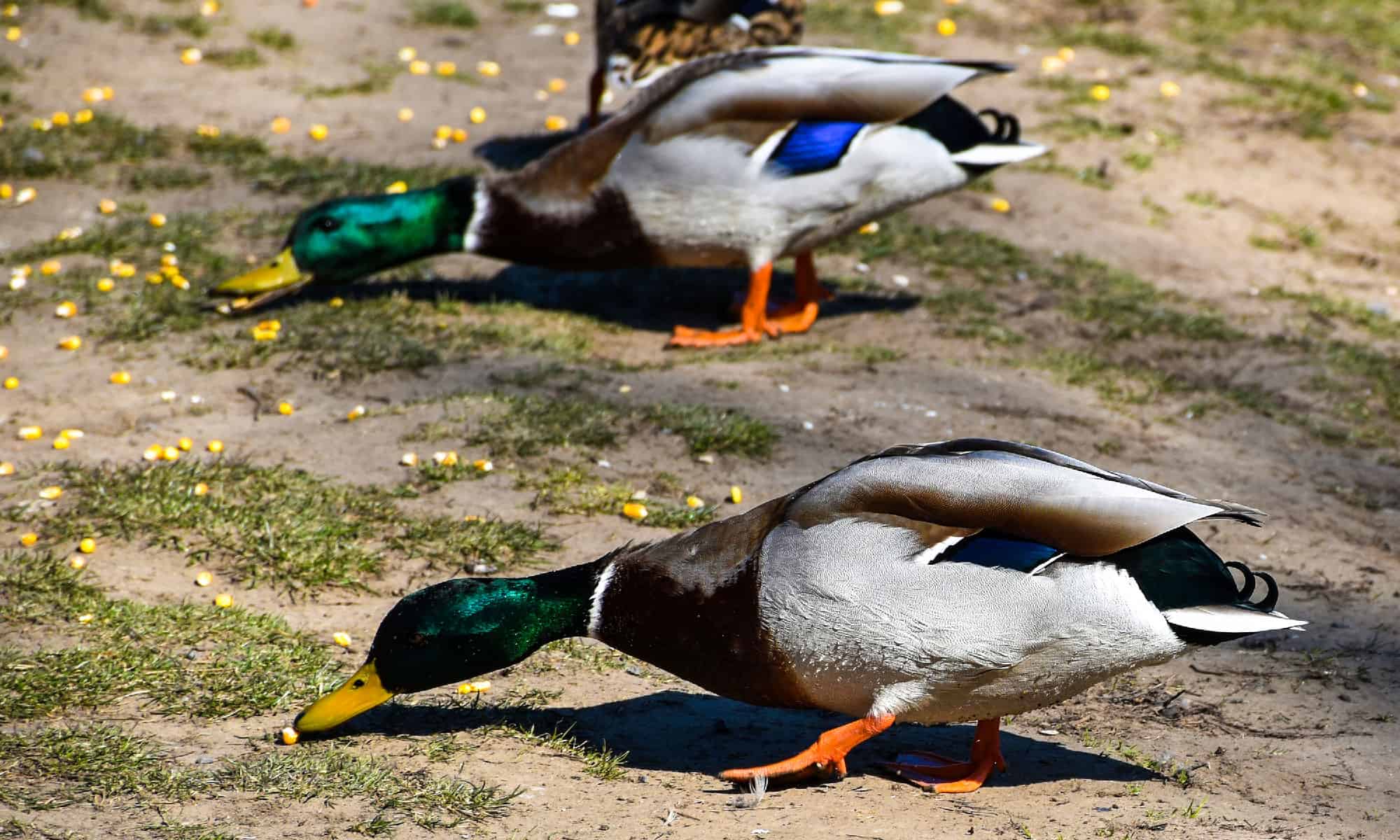
Sweetcorn is a huge hit with ducks, it’s full of vitamins that keep feathers in tip-top shape.
©Laszlo66/Shutterstock.com
Like peas, sweet corn is packed with vitamins, minerals, and barely any fat. Its starch content is a healthy way for ducks to feel full, and they just love eating it.
Sweetcorn is great value, and ducks don’t mind if it’s frozen (defrost first), tinned, or fresh.
3. Lettuce

Shredded lettuce is a good replacement for aquatic weeds.
©Luka Hercigonja/Shutterstock.com
Ducks naturally eat aquatic weeds, so lettuce is a great way to replace leafy green goodness. Any lettuce type is good, but do make sure it’s not slimy or rotten because this makes ducks unwell, or it’ll be left to foul the water.
Give lettuce a rinse before offering it to ducks to remove pesticide traces.
4. Cabbage
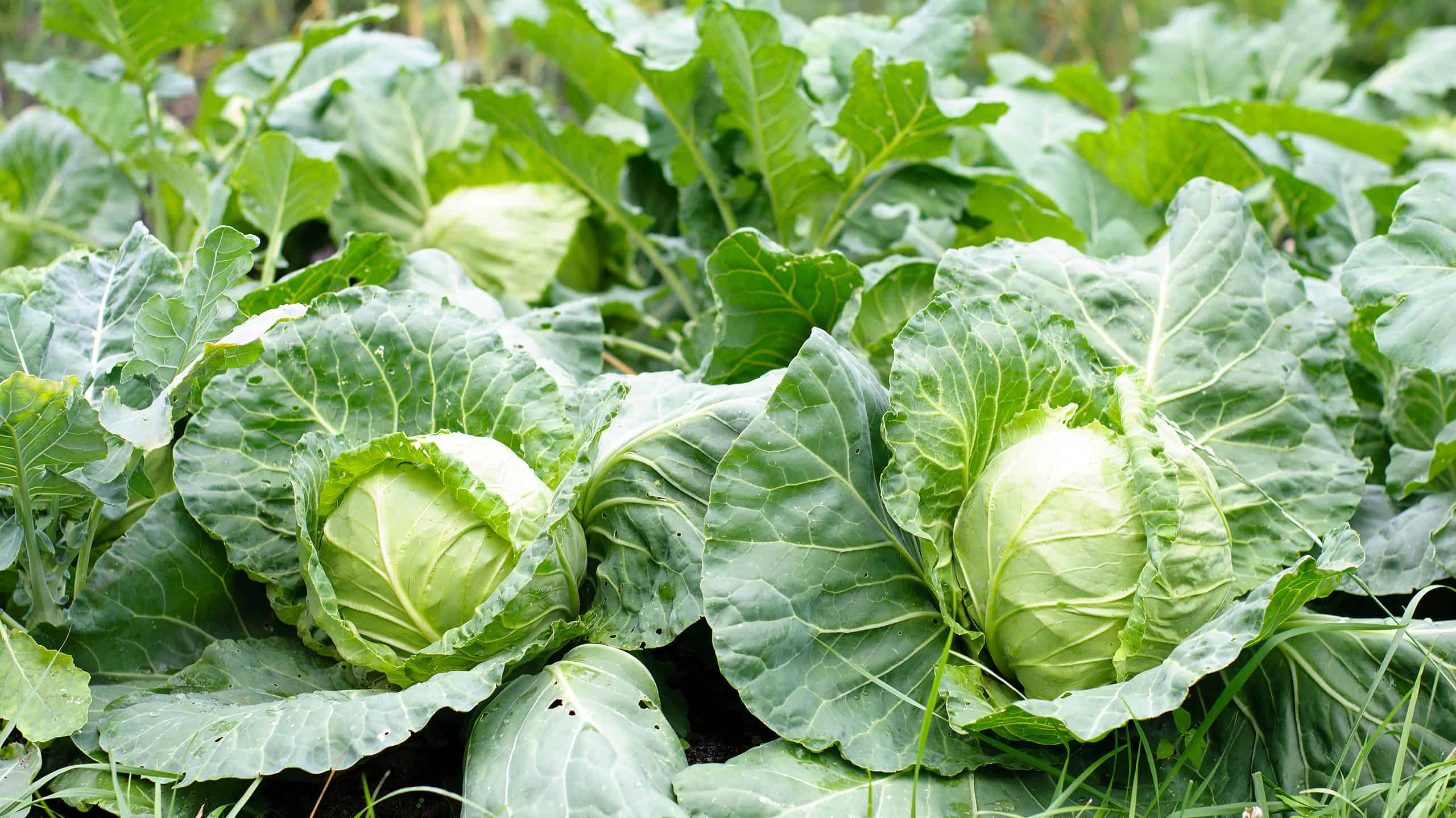
All varieties of cabbage, including Brussels sprouts, make good duck food.
©iStock.com/Lusyaya
Cabbage is another healthy green vegetable for ducks. Again, wash and shred the leaves first, but don’t worry about cooking it. That said, ducks also enjoy leftover cooked cabbage if it’s not salted.
All varieties of cabbage make good duck food. Savoy, red, sweetheart, and Brussels sprouts, too – they’re actually part of the cabbage family. Encourage kids to eat their greens by showing them a duck’s enthusiasm for leaves!
5. Kale
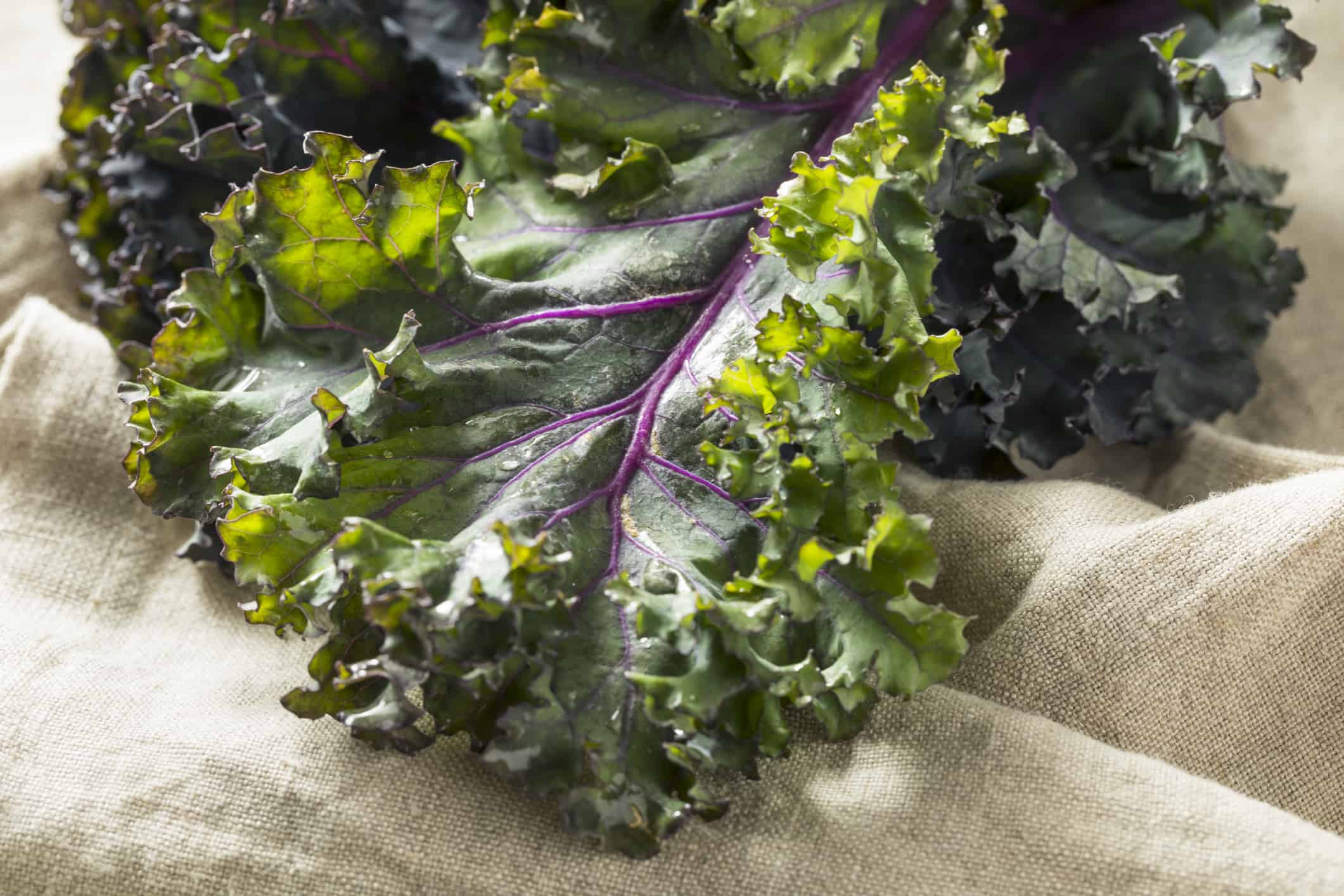
Ducks enjoy eating nutrient-dense kale, just wash and shred leaves first.
©iStock.com/bhofack2
Kale is great for humans and ducks alike. Iron and mineral-packed dark green leafy veg are high on the “good things to feed ducks” list because they’re so healthy. Kale is particularly full of vitamin A, which boosts eyesight. Handy for a duck, keeping one eye out for crafty foxes.
Wash kale to remove trace pesticides and shred it first. Large kale leaves lead to unpleasant fights between ducks,. They’re all keen to get their beaks on it.
6. Green Beans
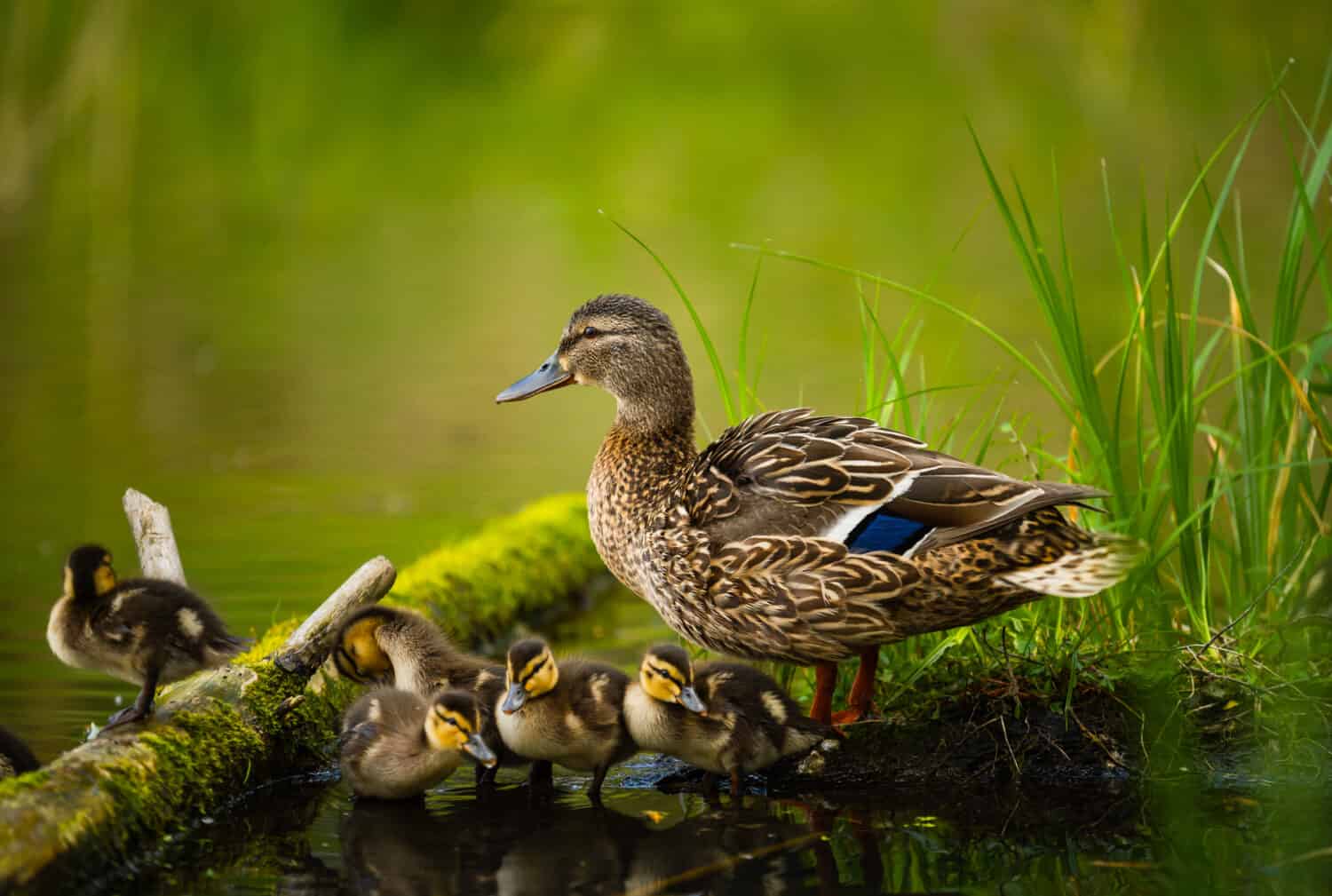
Green beans, either frozen, tinned, or fresh fill ducks with healthy nutrients.
©Pazyuk/Shutterstock.com
Tinned, frozen, or fresh green beans are a real treat for ducks who appreciate greens. There’s no need to cook them; just let frozen green beans thaw out first. If they’re long, chop them into half-inch-sized pieces.
7. Uncooked Oats
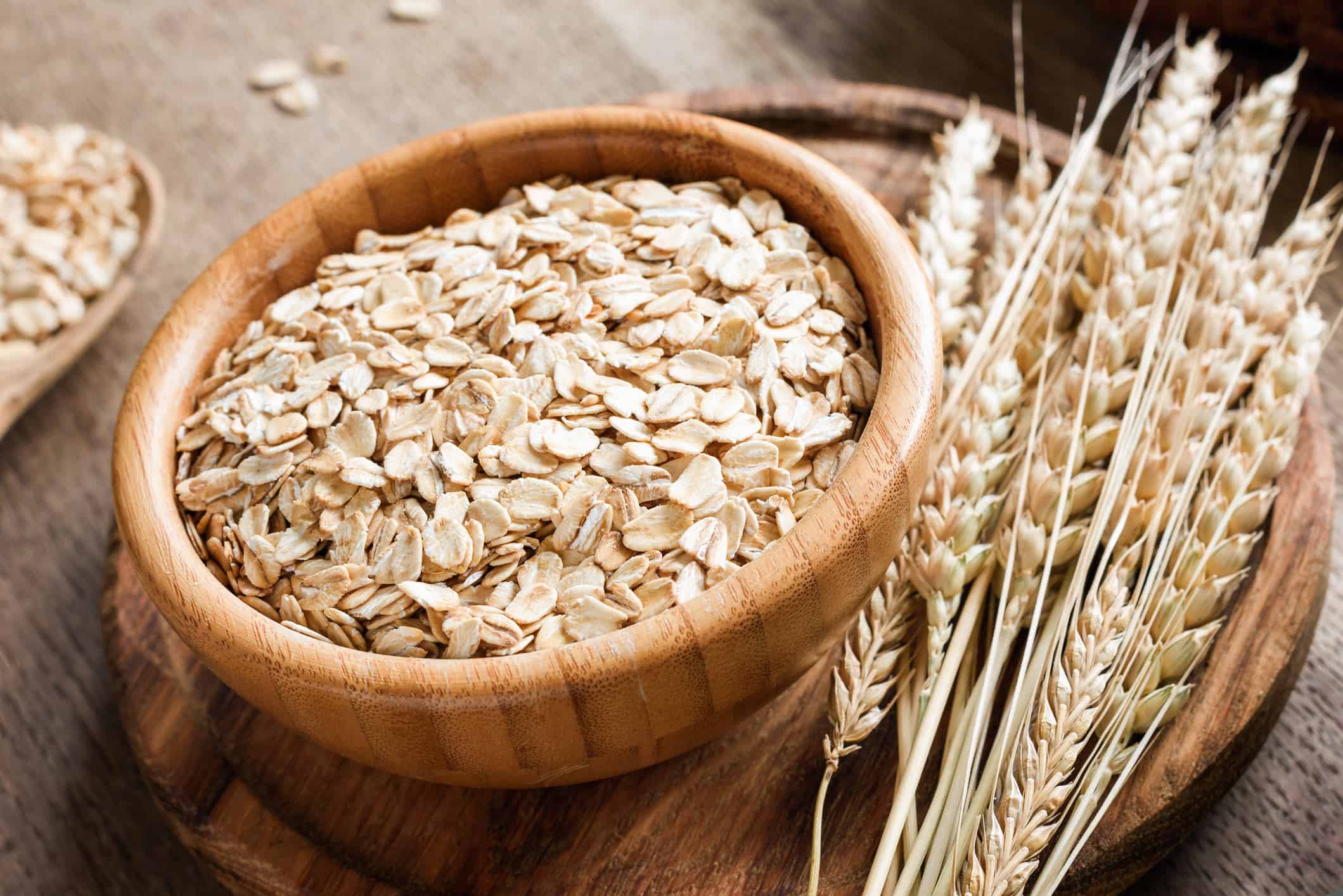
Only offer ducks uncooked oats because cooked oats are too sticky.
©Arx0nt/iStock via Getty Images
Uncooked raw oats provide ducks with carbohydrates and energy, so they’re a great pick for the winter months instead of bread. Rolled oats or instant porridge oats both count; ducks love them.
However, don’t feed cooked or wet oats because the moist mixture sticks to ducks’ beaks. In the worst cases, this can glue their beaks shut. Wet oats wiped from a beak onto feathers are also a problem because they interfere with their insulation and waterproofing.
8. Sunflower Seeds
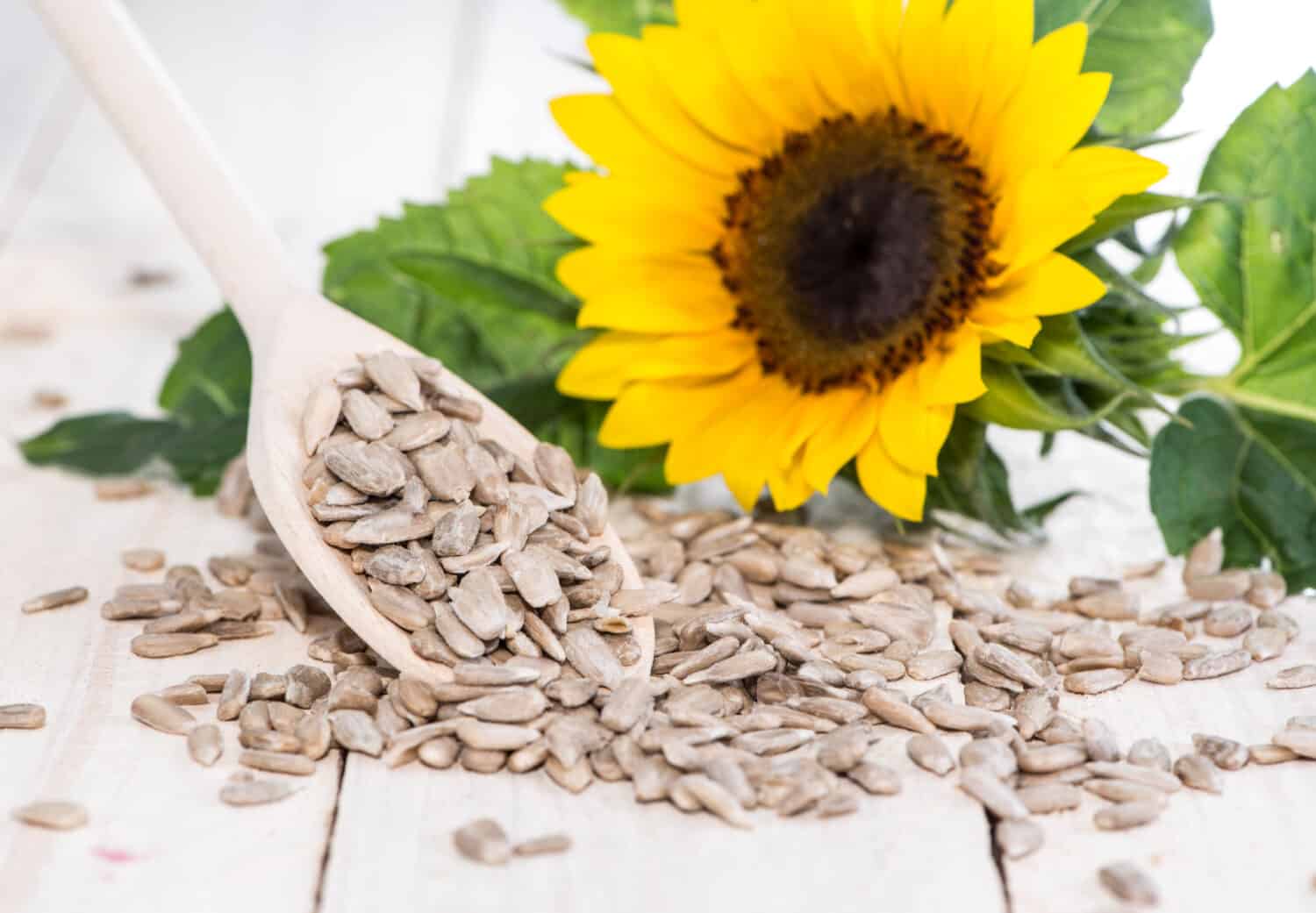
Sunflower seeds are one of the very best food options for wild ducks.
©HandmadePictures/Shutterstock.com
Most birds love sunflower seeds; they’re a top pick for yard bird feeders throughout the year, but sunflower seeds aren’t just for finches! Ducks adore them, too.
The best value sunflower seeds come in bulk purchase, but they are pricey, so consider splitting the cost with a friend. If you grow sunflowers in the yard, save their heads for free duck food.
Sunflower seeds are packed with healthy fats that birds need, and there’s plenty of protein, too. Protein keeps their muscles strong enough to fly, which is important for prey birds.
9. Wild Bird Seed Mix
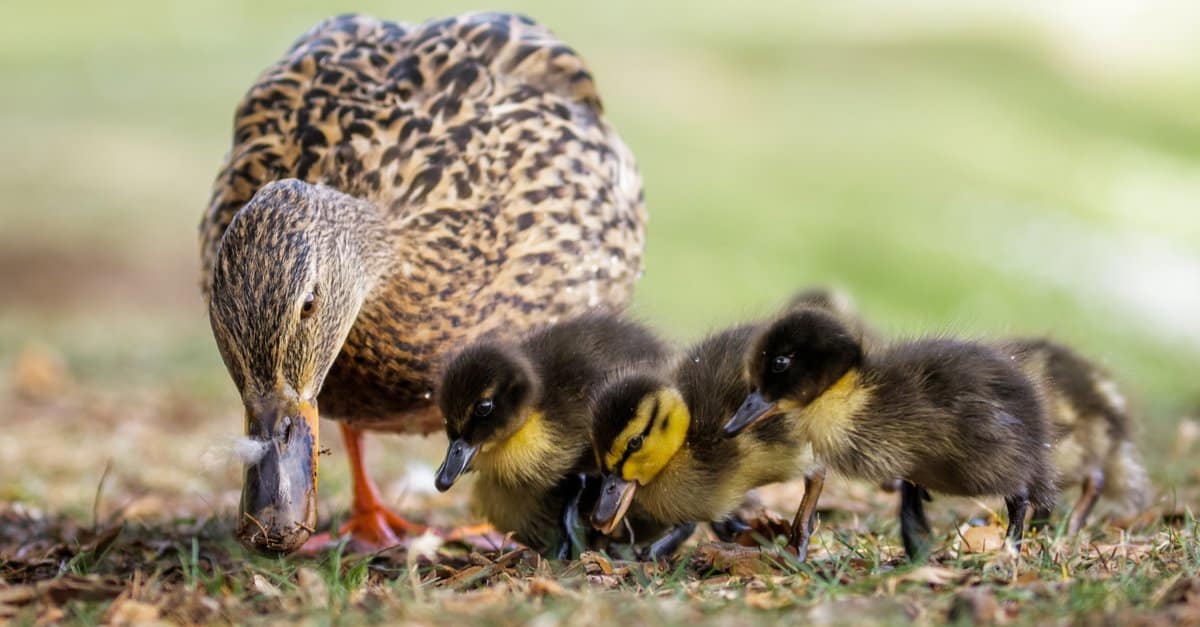
Wild bird seed mix is cheaper than sunflower seeds, perfect for hordes of hungry ducks.
©shaftinaction/Shutterstock.com
A wild bird seed mix is a cheaper but still nutritious option than sunflower seeds. Because it contains more of the filler seeds that songbirds ignore, it costs less. Ducks don’t mind that filler wheat; they’ll be grateful for the food.
10. Sliced Grapes
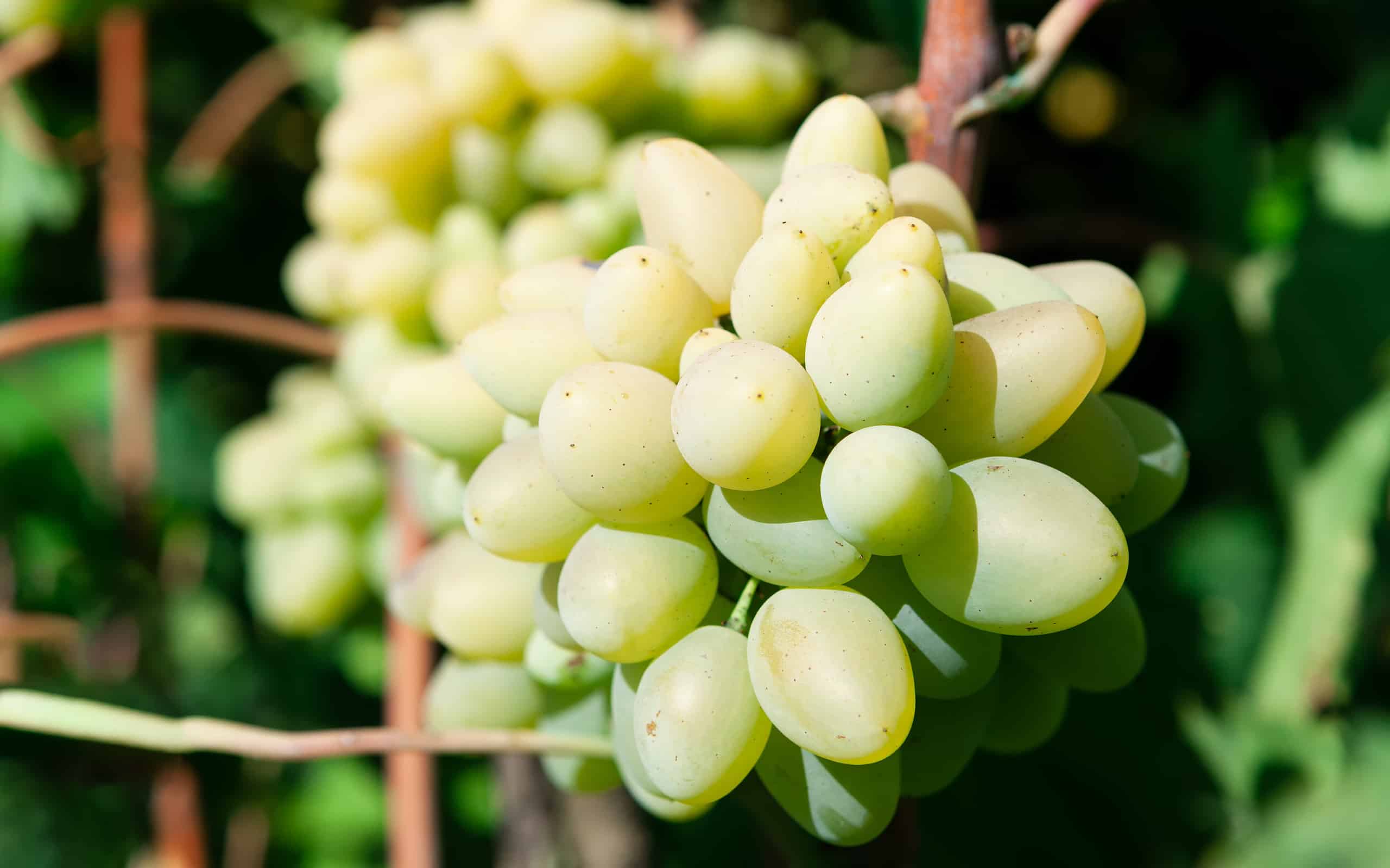
Ducks go crazy for sliced grapes, often taking them from your hand.
©RussieseO/ via Getty Images
A duck snack fit for an emperor is a pile of sliced grapes! Whole grapes pose a choking hazard, but sliced grapes are a hit with ducks that enjoy their sweet flavor.
Wash grapes first and cut them in half, longways as you would for a toddler. Ducks love them so much they’ll often take them from your outstretched palm.
11. Cracked Corn
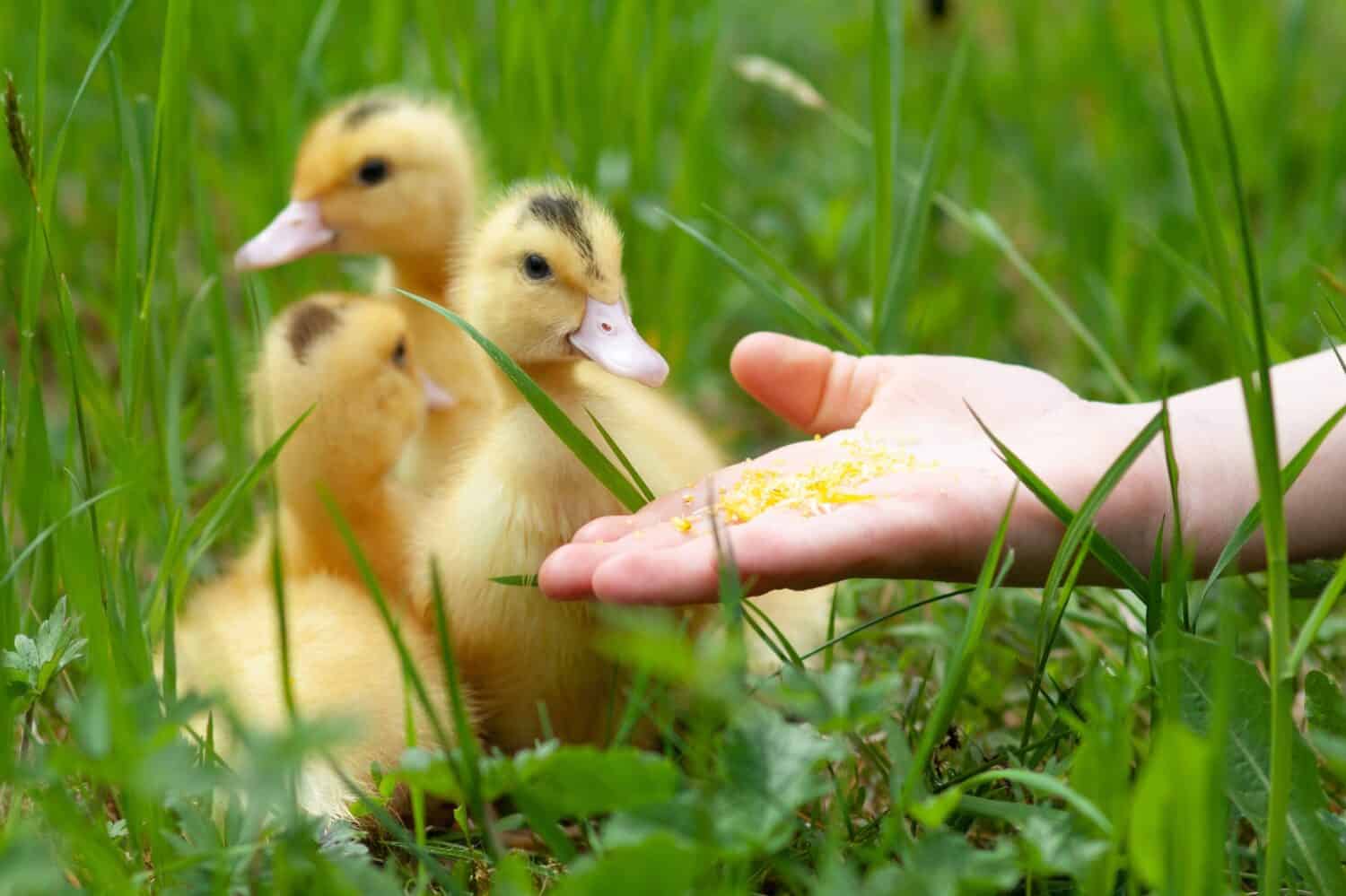
Cracked corn should be fed to ducks in small pieces to avoid choking.
©Andrii Zastrozhnov/Shutterstock.com
There’s plenty of fiber, vitamins, and minerals in cracked corn kernels. These little pieces of corn are a godsend for ducks, especially in winter when there’s little else to offer.
It’s important to crack corn kernels first to avoid any choking issues. Many stores sell already cracked corn; it’s like they’re waiting for duck lovers to arrive and buy it.
Food Ducks Can’t Eat
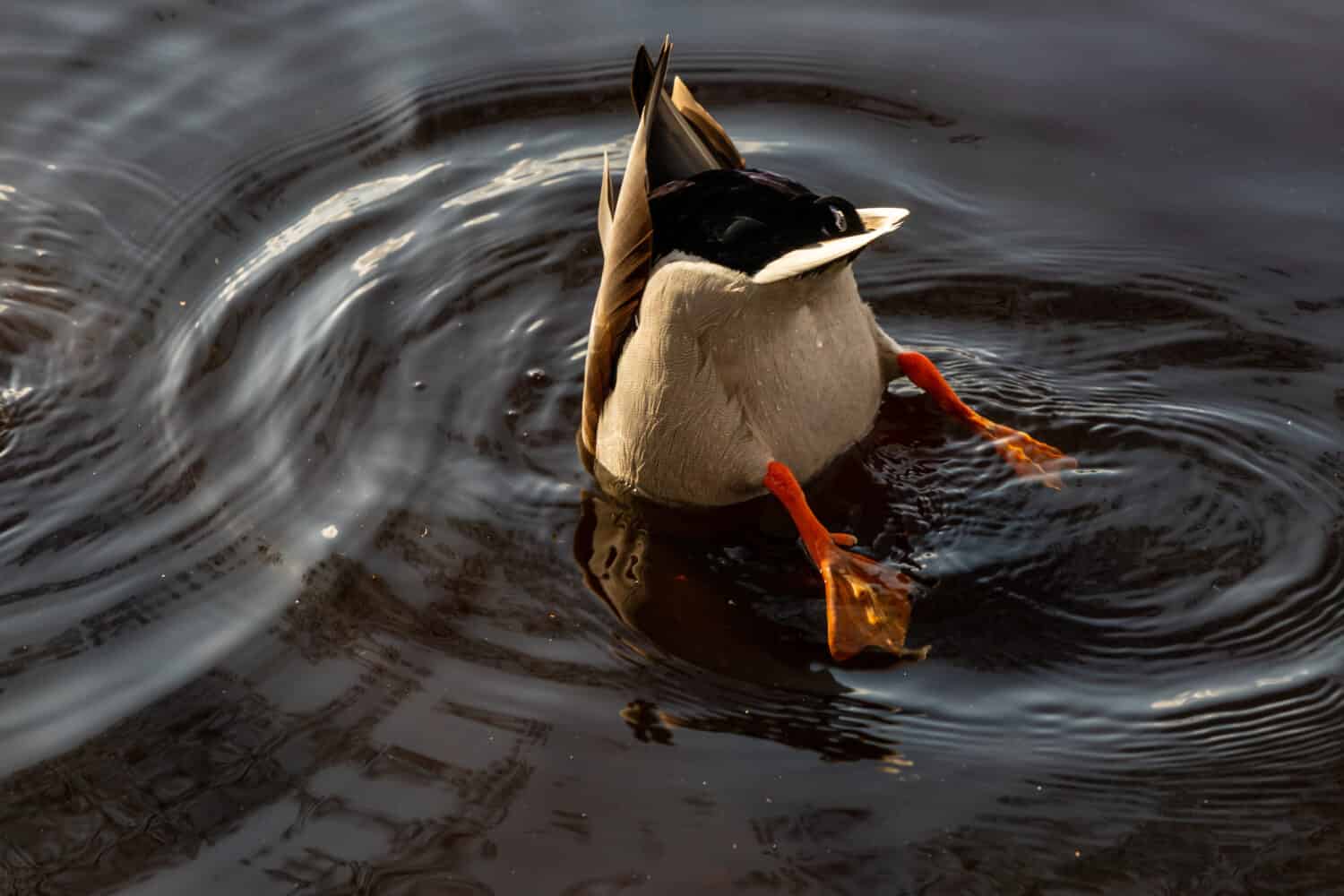
Salty, sugary, spiced, or oily human foods are not good for ducks.
©Evelyn Apinis/Shutterstock.com
So, those are the top 11 foods for ducks, but are there foods that ducks should never eat?
Yes. Although bread is not a great choice for ducks, a little bit is OK. However, these foods are a definite no for ducks:
- Any moldy or rotten food
- Salty or sugary food
- Spices
- Alcohol
- Oily foods
- Onions
- Avocado
- Rhubarb
- Eggplant
- Raw or uncooked dried beans
- Green tomatoes
And surprisingly, spinach. Spinach prevents calcium absorption, which causes egg-binding issues that can be fatal.
The photo featured at the top of this post is © OLOS/Shutterstock.com
Thank you for reading! Have some feedback for us? Contact the AZ Animals editorial team.







